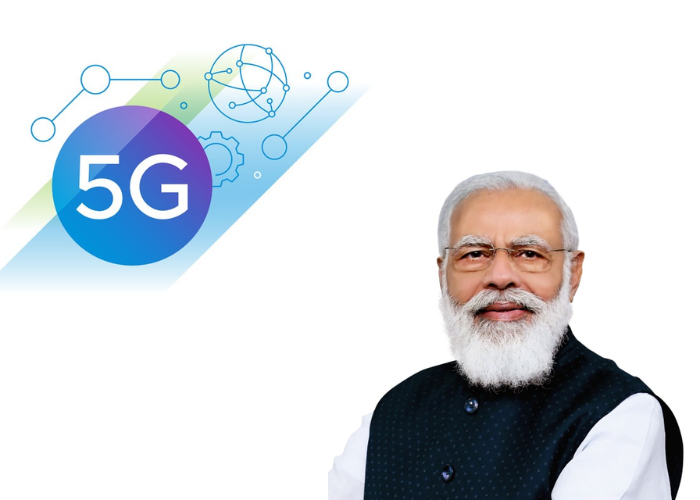Today marks a historic day for 21st Century India, a day that will be remembered for many years to come. Prime Minister Narendra Modi launched the 5G network in India and with it ushered in a new era for the country. This launch of 5G technology will revolutionize the way people access information and communicate with each other.
PM Modi Launches 5G in India
On July 22, 2020, Prime Minister Narendra Modi made history when he launched the 5G technology in India. This marks the beginning of a new era in the country as it is now the first one in South Asia to have access to this technology. 5G is the fifth generation of wireless mobile communication technology and it is expected to revolutionize the way we communicate and interact in the coming years. It will enable faster data transfer speeds, improved latency, and better connectivity. This will not only improve the user experience of internet users but will also create possibilities for new applications and services. It is believed that the introduction of 5G could bring about a technological revolution in India, and help the country become a major player in the global digital economy. This is indeed a historic day for 21st century India.
Historic Day for 21st Century India
It was a historic day for 21st Century India on July 4, 2020 as Prime Minister Modi launched 5G in India. This launch marks a major milestone in India’s digital transformation journey and opens up a world of possibilities for its citizens. 5G is the fifth generation of wireless technology and offers speeds up to 100 times faster than 4G, as well as improved latency and better support for more connected devices. This will revolutionize the way Indians consume digital services, from streaming video to online gaming and from healthcare to education. It will also pave the way for the development of new technologies such as autonomous vehicles and the Internet of Things, which will bring about a more connected and efficient world.
With this launch, India is now officially among the few countries in the world with 5G networks, and the first in South Asia. It is a moment to be proud of and will surely give the country a boost in its mission to become a digital superpower.
5G Impact on the Indian Economy
The launch of 5G in India marks a historic day for 21st Century India. The launch of 5G technology is a major milestone in India’s effort to become a digital superpower. 5G technology is the most advanced and secure wireless technology, offering faster speed and improved data connectivity. It has the potential to revolutionize the way businesses operate, and bring immense competitive advantage to the Indian economy. 5G will enable India to be at the forefront of the new digital revolution and lead the world in a new era of digital transformation.
5G will have a dramatic impact on the Indian economy. It will open up a world of opportunities to entrepreneurs, innovators, and businesses. It will enable faster data transmission, improved security, and reliable internet connection. This will enable businesses to leverage the power of the internet to improve efficiency and customer experience. Furthermore, it will help to create new opportunities for the Indian economy by connecting businesses with new markets, reducing operational costs, and providing more efficient services.
It will also help to foster innovation, improve access to capital, and create jobs. The launch of 5G will enable India to develop new products and services, enable more efficient delivery of services, and enable businesses to compete on a global scale. In addition, 5G will help to reduce the digital divide between rural and urban areas and help to increase access to digital services.
Overall, the launch of 5G in India marks a historic day for 21st Century India and the Indian economy. 5G will enable India to become a digital superpower, create new opportunities for businesses, and foster innovation. It will have a dramatic impact on the Indian economy, creating jobs and improving access to digital services.
Benefits of 5G for the Indian Population
The introduction of 5G into India has been an historic event for the 21st century, as it will bring multiple benefits for the Indian population. 5G technology is capable of providing much faster internet speeds than the 4G technology, which means it will enable faster downloads, streaming and uploading, making it ideal for those who rely on the internet for their daily activities.
Additionally, 5G will provide improved latency and reliability, which means that users will experience fewer disruptions in their internet connections. This will be a great benefit for businesses and individuals who need a reliable and fast connection.
Moreover, 5G will enable more efficient use of bandwidth, resulting in reduced costs for operators and consumers. Furthermore, 5G networks can cover wider areas than 4G, which will help to connect people in remote areas and rural India.
Finally, 5G will allow for the development of new technologies, such as self-driving cars and remote medical services, which can further improve the quality of life of the Indian population.
Challenges Ahead for 5G in India
The launch of 5G in India is a historic moment for the 21st century. PM Modi’s initiative has made the nation proud and sets India ahead of its competitors in the race towards technological advancement. However, the launch of 5G in India also brings with it its own unique set of challenges. Despite the hype, there are still significant issues in terms of infrastructure, network coverage, cost, and security that need to be addressed.
The development of 5G infrastructure requires an investment of billions of dollars and an overhaul of existing network infrastructure. This is a gargantuan task that requires both financial and technical support from the government as well as from telecom companies. Furthermore, the 5G network coverage still remains limited to certain areas only. This means that many people living in rural and remote areas in India may not have access to this technology.
The cost of 5G services is another challenge. The cost of 5G services is expected to be higher than existing 4G services, which could be a deterrent for people who are on a budget. Additionally, there are concerns about the security of 5G networks that need to be addressed. The security of 5G networks is an important issue, as they are more vulnerable to cyber-attacks due to the increased speed and data transfer.
These challenges may seem daunting but can be overcome with proper planning and execution. The government and telecom companies must work together to ensure that the 5G infrastructure is secure and reliable. Additionally, telecom companies must make 5G services affordable for the masses. With the right policies and initiatives, India can become a leader in the 5G revolution.
Conclusion
Today marks a historic day for India, as Prime Minister Modi has made a leap forward in technology by launching the 5G connectivity in India. This is a major step towards modernizing the country, and it is sure to bring about a number of benefits, such as faster internet speeds, better data transmission, and improved infrastructure. With this launch, India is now one of the few countries in the world to have access to the 5G network and has put itself firmly on the map as a tech-savvy nation. We can expect to see more exciting developments in the near future, as India continues to embrace the digital age.






